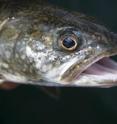Mercury levels are increasing in popular species of game fish in Lake Erie
Mercury levels in a popular species of game fish in Lake Erie are increasing after two decades of steady decline, scientists are reporting. The study, the most comprehensive to date on mercury levels in Great Lakes fish, is in ACS' Environmental Science & Technology, a semi-monthly journal. Satyendra Bhavsar and colleagues note that the Great Lakes is the largest group of freshwater lakes in the world. The lakes are of significant economic importance to the United States and Canada due to the area's $7 billion fishing industry. High levels of mercury in fish can potentially cause adverse health effects in people. Although government regulations and improved emissions control technologies have greatly reduced mercury emissions in the environment, their impact on mercury levels in Great Lakes fish is unclear.
The scientists studied mercury levels in 5807 fish samples collected from the lakes between the 1970s and 2007. The samples included lake trout and walleye, two of the most common species of game fish caught in the region. The researchers found that mercury levels in the fish steadily declined from the mid-1970s to 2007 in the upper Great Lakes (Superior and Huron). In recent years (between 1990 and 2007), however, the mercury concentrations leveled-off in Lake Ontario walleye but appear to be increasing in Lake Erie walleye. The mercury increases in Lake Erie walleye are likely caused by a combination of factors, including modifications in Lake Erie's foodweb due to invasions of dreissenid mussels and round goby, the scientists suggest.
Source: American Chemical Society
Other sources
- N.W.T. board seeks own lake mercury testsfrom CBC: HealthThu, 15 Jul 2010, 22:49:08 UTC
- Mercury levels up in Lake Erie fishfrom UPIWed, 14 Jul 2010, 20:56:26 UTC
- Mercury levels are increasing in popular species of game fish in Lake Eriefrom Science BlogWed, 14 Jul 2010, 17:07:22 UTC
- Mercury levels are increasing in popular species of game fish in Lake Eriefrom Science BlogWed, 14 Jul 2010, 17:07:21 UTC
